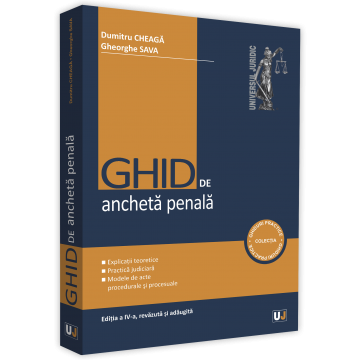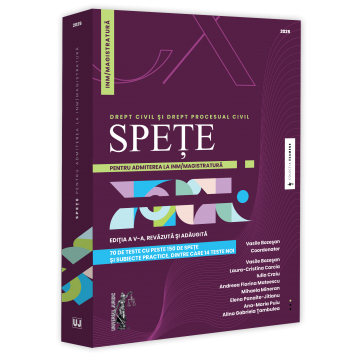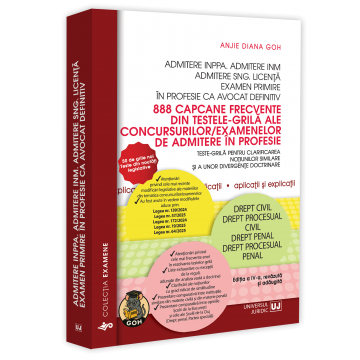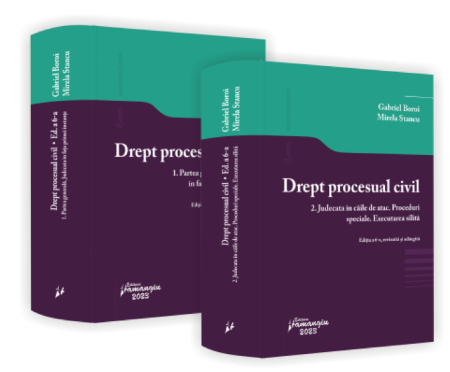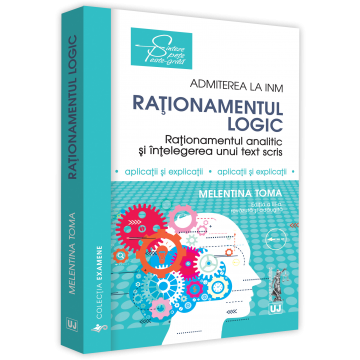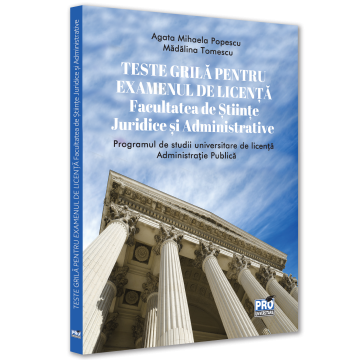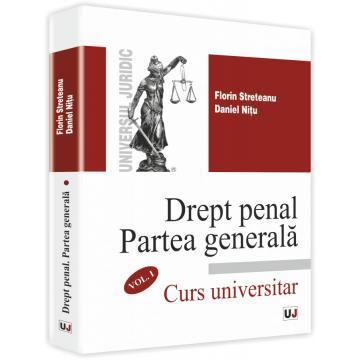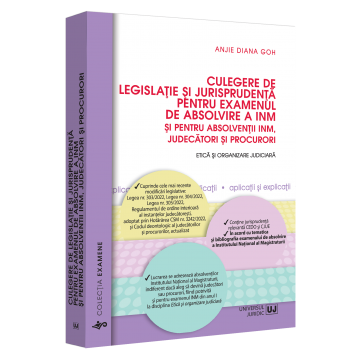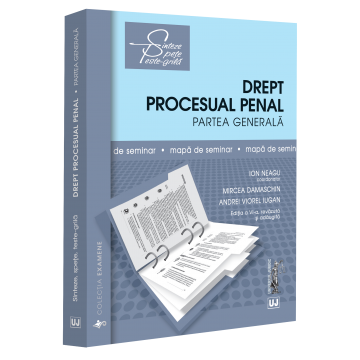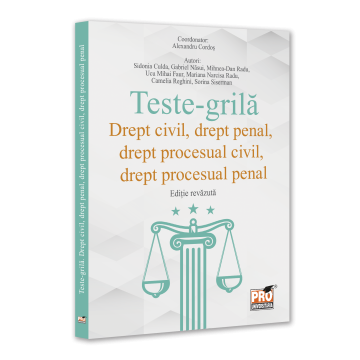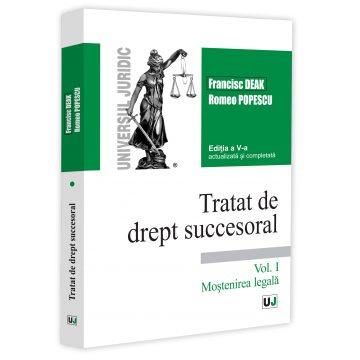Manuscript proposals: [email protected] / 0745 204 115 //// Tracking orders Individuals / Sales: 0745 200 357 / Orders Legal entities: 0721 722 783
ISBN: 978-606-28-0326-1
DOI: 10.5682/9786062803261
Publisher year: 2015
Pages: 274
Publisher: Editura Universitară
Author: George Magureanu
Product Code:
9786062803261
Do you need help?
0745 200 357
- Description
- Download (1)
- Authors
- Content
- More details
- Reviews (0)
The paper "Elements of law" is a university course for the legal training of students in economic faculties, as an integral part of specialized training.
The training of future economists requires thorough knowledge in the field of law, in general, to acquire the skills necessary for the interpretation and application of legal rules to relations with business partners, with other institutions with which they will be in civil or commercial relations.
By the way it was designed, the course aims to form a legal awareness that refers, first of all, to the need to comply with the laws, other normative acts governing the economic field and legal relations between participants in these relations, discipline in the exercise of the profession and of the responsibility of natural and legal persons for the acts and deeds they commit.
The course considers, in particular, the notions and relationships of private law, relationships that underlie the economic and social life of individuals and legal entities.
The legal relations of a civil nature that will be concluded by the specialists in the economic field, must not be seen in isolation, but in the context of the other socio-economic relations with which they are in interdependent relations.
The course analyzes the main legal institutions in the field of private law that legally regulate the economic system as a factor in the development of human society.
It includes a general part, which defines the law in general, its functions and principles as well as the Romanian legal system with its structural elements.
Particular emphasis was placed on the correct understanding and application of legal norms governing private law relationships, their proof, fact and civil legal act, extinctive prescription, legal institutions on property rights, the contract as a source of civil obligations, civil liability and in the final part, the most important special contracts with which the business environment operates and which, under certain aspects, constitute exceptions to the common law contract.
We aimed to offer economist students a didactic material, synthetic and concise, for mastering the main legal institutions of law in general and civil law in particular, which regulate economic relations.
And through this work we express our gratitude to Mrs. Prof. univ. dr. Lucia Giosan and Mr. Prof. univ. dr. Florea Magureanu, who, from the first years of operation of the Romanian-American University, elaborated, in several editions, a Law course for students from the faculties with economic profile, a course that was the basis for the structure and realization of this paper.
Product compliance information
The training of future economists requires thorough knowledge in the field of law, in general, to acquire the skills necessary for the interpretation and application of legal rules to relations with business partners, with other institutions with which they will be in civil or commercial relations.
By the way it was designed, the course aims to form a legal awareness that refers, first of all, to the need to comply with the laws, other normative acts governing the economic field and legal relations between participants in these relations, discipline in the exercise of the profession and of the responsibility of natural and legal persons for the acts and deeds they commit.
The course considers, in particular, the notions and relationships of private law, relationships that underlie the economic and social life of individuals and legal entities.
The legal relations of a civil nature that will be concluded by the specialists in the economic field, must not be seen in isolation, but in the context of the other socio-economic relations with which they are in interdependent relations.
The course analyzes the main legal institutions in the field of private law that legally regulate the economic system as a factor in the development of human society.
It includes a general part, which defines the law in general, its functions and principles as well as the Romanian legal system with its structural elements.
Particular emphasis was placed on the correct understanding and application of legal norms governing private law relationships, their proof, fact and civil legal act, extinctive prescription, legal institutions on property rights, the contract as a source of civil obligations, civil liability and in the final part, the most important special contracts with which the business environment operates and which, under certain aspects, constitute exceptions to the common law contract.
We aimed to offer economist students a didactic material, synthetic and concise, for mastering the main legal institutions of law in general and civil law in particular, which regulate economic relations.
And through this work we express our gratitude to Mrs. Prof. univ. dr. Lucia Giosan and Mr. Prof. univ. dr. Florea Magureanu, who, from the first years of operation of the Romanian-American University, elaborated, in several editions, a Law course for students from the faculties with economic profile, a course that was the basis for the structure and realization of this paper.
Author
-
Elemente de drept. Curs pentru facultatile cu profil economic
Download
George Magureanu
content
INTRODUCTION / 13
Chapter 1. GENERAL CONSIDERATIONS REGARDING LAW / 15
The notion and importance of law / 15
Divisions of law / 17
The legal system / 18
The systemic nature of law / 18
The Romanian legal system / 18
The branches of law in Romania / 19
Functions and principles of law / 21
Chapter 2. LEGAL NORM / 23
The notion and the characteristic features of the legal norms / 23
The structure of the legal norm / 24
Classification of legal norms / 25
Legal nature of technical norms / 27
Chapter 3. APPLICATION AND INTERPRETATION OF LAW / 28
Law enforcement / 28
Interpretation of legal norms / 30
Chapter 4. ACTION OF LEGAL RULES IN TIME, IN SPACE AND ON PERSONS / 32
The action of legal norms in time / 32
The action of legal norms in space / 34
The action of legal norms on persons / 35
Chapter 5. DEFINITION, ROLE, PRINCIPLES AND DEFINITION OF CIVIL LAW / 37
Definition and object of civil law regulation / 37
The role and importance of civil law / 39
Principles of civil law / 39
Delimitation of civil law from other branches of law / 41
Chapter 6. CIVIL LEGAL REPORT / 44
Introduction to the study of the civil legal relationship / 44
Definition of the civil legal relationship / 44
The premises of the civil legal report. / 44
The characters of the civil legal relationship. / 45
The structure of the civil legal relationship / 47
Structural elements of the civil legal relationship / 47
Subjects of the civil legal report / 47
Defining notions regarding the subjects of the civil legal relationship / 47
Determining the subjects of the civil legal relationship. / 48
Plurality of the subjects of the civil legal relationship. / 48
Changing the subjects of the civil legal relationship. / 49
Civil capacity of the subjects of the civil legal relationship. / 49
Content of the civil legal report / 52
General considerations regarding the notion of content of the civil legal relationship / 52
Subjective civil rights; notion and classification / 53
Recognition and protection of civil rights / 57
Exercise of subjective civil rights and abuse of right / 58
The object of the civil legal report. The goods / 59
Definition of the civil legal relationship. / 59
Goods: Notion and classification. / 60
Sources of the civil legal report / 67
The notion of source of the civil legal relationship. / 67
Classification of the sources of concrete civil legal relations / 67
Evidence of the concrete legal report / 69
The notion, importance and classification of evidence. / 69
Proof by documents. / 70
Authentic documents / 71
Documents under private signature / 73
Documents under private signature / 76
Other categories of documents / 84
Evidence through expertise reports / 85
Chapter 7. CIVIL LEGAL ACT / 87
The notion, definition and classification of civil legal acts / 87
The notion of the civil legal act / 87
Classification of civil legal acts / 88
The conditions of the civil legal act / 92
The notion of the conditions of the civil legal act / 92
Classification of the conditions of the civil legal act / 93
Ability to conclude the civil legal act / 94
Consent / 95
Consent as an element of legal will / 95
The notion of consent / 96
Validity requirements of the consent / 97
Defects of consent / 98
The object of the civil legal act / 103
The notion of the object of the civil legal act / 103
Object conditions / 104
Cause (purpose) of the civil legal act / 106
The notion of the cause of the civil legal act / 106
Conditions of the case / 108
Form of the civil legal act / 109
The notion of the form of the civil legal act / 109
Classification of the formal conditions of the civil legal act / 109
The modalities of the civil legal act / 111
The notion. / 111
The term / 111
The notion of the term of the civil legal act / 111
Classification of the terms of the civil legal act / 111
The effects of the terms of the civil legal act / 113
Causes of nullity of the civil legal act / 125
General notions. / 125
Causes of absolute nullity. / 126
Causes of relative nullity / 126
The legal regime of nullity. / 127
Definition. / 127
The legal regime of absolute nullity. / 127
The legal regime of relative nullity. / 128
Comparison of legal regime between absolute nullity and between relative nullity. / 128
The effects of nullity. / 128
Principles of the effects of nullity. / 129
Chapter 8. EXTINCTIVE PRESCRIPTION / 130
Extinctive prescription: Notion, regulation, delimitation, effects / 130
Definition of extinctive prescription / 130
Regulation. / 131
Delimitation of the extinctive prescription. / 131
The effect of extinctive prescription. / 131
Scope of the extinctive prescription / 132
Notion. / 132
The field of extinctive prescription within the patrimonial rights. 132
The field of extinctive prescription within non-patrimonial rights / 133
Extinctive prescription terms / 133
Notion and classification / 133
General terms of extinctive prescription / 134
Special terms of extinctive prescription / 134
Beginning of the limitation period (expiry of the limitation period) / 136
Suspension and intreruption of the extinctive prescription / 138
Suspension of the extinctive prescription. / 138
The notion of suspension. / 138
Causes of suspension of the limitation period. / 138
The effects of prescription suspension. / 139
Interruption of the limitation period / 140
Notion. / 140
Causes of interruption of the limitation period. / 140
Reinstatement / 140
Notion and regulation. / 140
The causes of the rescheduling refer to "duly justified" circumstances / 140
Chapter 9. HERITAGE OF PEOPLE / 142
The notion of patrimony / 142
Legal characteristics of the patrimony / 143
The functions of the patrimony / 145
Chapter 10. PROPERTY LAW / 149
General considerations regarding the patrimony / 149
Considerations regarding the real rights and obligations / 149
The notion of real rights and real obligations / 149
Classification of real rights / 151
Differences between real rights and debt rights / 152
Property right. General characterization / 153
The economic concept and the legal concept of property / 153
Definition, legal characters, object and extent of the property right / 154
Attributes (prerogatives) of the property right / 159
Forms of property right / 162
The legal modalities of the property right / 166
Solvable property. / 167
Cancellable property. / 167
Common property / 168
Dismemberments of the right of pro-friendship / 170
Defending the property right by the action in claim / 172
Chapter 11. CIVIL OBLIGATIONS / 177
Introductory elements. Notion / 177
The structure of the obligatory legal relationship / 178
Classification of civil obligations / 180
Sources of civil obligations / 183
Notion. General considerations / 183
Classification of sources of obligations / 183
The contract, the main source of civil obligations / 184
The contract: notion and importance / 184
Classification of contracts / 185
Conclusion of the contract / 189
The effects of the contract / 191
Unilateral legal act - source of civil obligations / 194
Payment of undue work - source of civil obligations (undue payment) / 195
Enrichment without just cause (just cause) source of civil obligations 196
Illicit act causing damages - source of civil obligations. 198 11.5.9. The effects of civil obligations / 200
Voluntary execution of obligations / 200
Forced execution in kind of obligations. / 203
Indirect execution of obligations (execution by equivalent) / 204
Transmission and transformation of obligations / 207
Transmission of civil obligations / 207
Subrogation in the creditor's rights by paying the debt / 209
Ways of transforming obligations / 211
Ways of extinguishing civil obligations / 212
Payment - way of extinguishing civil obligations. / 212
Giving in payment. / 213
Debt forgiveness - way of extinguishing the civil obligation (debt remission). / 213
The fortuitous impossibility of executing the way of extinguishing the civil obligations. / 214
Compensation - way of extinguishing the civil obligation / 215
Confusion - a way of extinguishing the civil obligation. / 216
Novation as a way of extinguishing the obligation. / 217
Guarantee of civil obligations / 217
Personal guarantees. Surety (bail). / 218
Real guarantees. / 221
Penalty clause. / 227
Arvuna. / 228
Chapter 12. CIVIL LIABILITY / 229
Civil liability. Notion. Principles / 229
The notion of civil liability / 229
Principles of civil liability / 229
Contractual civil liability / 231
The notion and the role of contractual civil liability / 231
Conditions of contractual civil liability / 231
Damages and interest clause / 234
The main situations that exonerate from responsibility / 237
Delinquent civil liability / 238
Definition and conditions. / 238
Forms of tortious civil liability. / 239
Chapter 13. Special contracts / 243
Sale-purchase contract / 243
Notion and characteristic features / 243
The effects of the sale-purchase contract / 245
Mandate contract / 250
Definition and regulation of the mandate contract / 250
Characteristic features of the mandate contract / 251
The effects of the mandate contract / 252
Termination of office / 254
Contract of carriage / 255
Notion and characteristic features / 255
The effects of the transport contract. / 256
Lease contract / 260
Notion and characteristic features. / 260
Conditions of validity of the lease contract / 262
The effects of the lease contract / 264
Termination of the lease. / 269
BIBLIOGRAPHY / 271
INTRODUCTION / 13
Chapter 1. GENERAL CONSIDERATIONS REGARDING LAW / 15
The notion and importance of law / 15
Divisions of law / 17
The legal system / 18
The systemic nature of law / 18
The Romanian legal system / 18
The branches of law in Romania / 19
Functions and principles of law / 21
Chapter 2. LEGAL NORM / 23
The notion and the characteristic features of the legal norms / 23
The structure of the legal norm / 24
Classification of legal norms / 25
Legal nature of technical norms / 27
Chapter 3. APPLICATION AND INTERPRETATION OF LAW / 28
Law enforcement / 28
Interpretation of legal norms / 30
Chapter 4. ACTION OF LEGAL RULES IN TIME, IN SPACE AND ON PERSONS / 32
The action of legal norms in time / 32
The action of legal norms in space / 34
The action of legal norms on persons / 35
Chapter 5. DEFINITION, ROLE, PRINCIPLES AND DEFINITION OF CIVIL LAW / 37
Definition and object of civil law regulation / 37
The role and importance of civil law / 39
Principles of civil law / 39
Delimitation of civil law from other branches of law / 41
Chapter 6. CIVIL LEGAL REPORT / 44
Introduction to the study of the civil legal relationship / 44
Definition of the civil legal relationship / 44
The premises of the civil legal report. / 44
The characters of the civil legal relationship. / 45
The structure of the civil legal relationship / 47
Structural elements of the civil legal relationship / 47
Subjects of the civil legal report / 47
Defining notions regarding the subjects of the civil legal relationship / 47
Determining the subjects of the civil legal relationship. / 48
Plurality of the subjects of the civil legal relationship. / 48
Changing the subjects of the civil legal relationship. / 49
Civil capacity of the subjects of the civil legal relationship. / 49
Content of the civil legal report / 52
General considerations regarding the notion of content of the civil legal relationship / 52
Subjective civil rights; notion and classification / 53
Recognition and protection of civil rights / 57
Exercise of subjective civil rights and abuse of right / 58
The object of the civil legal report. The goods / 59
Definition of the civil legal relationship. / 59
Goods: Notion and classification. / 60
Sources of the civil legal report / 67
The notion of source of the civil legal relationship. / 67
Classification of the sources of concrete civil legal relations / 67
Evidence of the concrete legal report / 69
The notion, importance and classification of evidence. / 69
Proof by documents. / 70
Authentic documents / 71
Documents under private signature / 73
Documents under private signature / 76
Other categories of documents / 84
Evidence through expertise reports / 85
Chapter 7. CIVIL LEGAL ACT / 87
The notion, definition and classification of civil legal acts / 87
The notion of the civil legal act / 87
Classification of civil legal acts / 88
The conditions of the civil legal act / 92
The notion of the conditions of the civil legal act / 92
Classification of the conditions of the civil legal act / 93
Ability to conclude the civil legal act / 94
Consent / 95
Consent as an element of legal will / 95
The notion of consent / 96
Validity requirements of the consent / 97
Defects of consent / 98
The object of the civil legal act / 103
The notion of the object of the civil legal act / 103
Object conditions / 104
Cause (purpose) of the civil legal act / 106
The notion of the cause of the civil legal act / 106
Conditions of the case / 108
Form of the civil legal act / 109
The notion of the form of the civil legal act / 109
Classification of the formal conditions of the civil legal act / 109
The modalities of the civil legal act / 111
The notion. / 111
The term / 111
The notion of the term of the civil legal act / 111
Classification of the terms of the civil legal act / 111
The effects of the terms of the civil legal act / 113
Causes of nullity of the civil legal act / 125
General notions. / 125
Causes of absolute nullity. / 126
Causes of relative nullity / 126
The legal regime of nullity. / 127
Definition. / 127
The legal regime of absolute nullity. / 127
The legal regime of relative nullity. / 128
Comparison of legal regime between absolute nullity and between relative nullity. / 128
The effects of nullity. / 128
Principles of the effects of nullity. / 129
Chapter 8. EXTINCTIVE PRESCRIPTION / 130
Extinctive prescription: Notion, regulation, delimitation, effects / 130
Definition of extinctive prescription / 130
Regulation. / 131
Delimitation of the extinctive prescription. / 131
The effect of extinctive prescription. / 131
Scope of the extinctive prescription / 132
Notion. / 132
The field of extinctive prescription within the patrimonial rights. 132
The field of extinctive prescription within non-patrimonial rights / 133
Extinctive prescription terms / 133
Notion and classification / 133
General terms of extinctive prescription / 134
Special terms of extinctive prescription / 134
Beginning of the limitation period (expiry of the limitation period) / 136
Suspension and intreruption of the extinctive prescription / 138
Suspension of the extinctive prescription. / 138
The notion of suspension. / 138
Causes of suspension of the limitation period. / 138
The effects of prescription suspension. / 139
Interruption of the limitation period / 140
Notion. / 140
Causes of interruption of the limitation period. / 140
Reinstatement / 140
Notion and regulation. / 140
The causes of the rescheduling refer to "duly justified" circumstances / 140
Chapter 9. HERITAGE OF PEOPLE / 142
The notion of patrimony / 142
Legal characteristics of the patrimony / 143
The functions of the patrimony / 145
Chapter 10. PROPERTY LAW / 149
General considerations regarding the patrimony / 149
Considerations regarding the real rights and obligations / 149
The notion of real rights and real obligations / 149
Classification of real rights / 151
Differences between real rights and debt rights / 152
Property right. General characterization / 153
The economic concept and the legal concept of property / 153
Definition, legal characters, object and extent of the property right / 154
Attributes (prerogatives) of the property right / 159
Forms of property right / 162
The legal modalities of the property right / 166
Solvable property. / 167
Cancellable property. / 167
Common property / 168
Dismemberments of the right of pro-friendship / 170
Defending the property right by the action in claim / 172
Chapter 11. CIVIL OBLIGATIONS / 177
Introductory elements. Notion / 177
The structure of the obligatory legal relationship / 178
Classification of civil obligations / 180
Sources of civil obligations / 183
Notion. General considerations / 183
Classification of sources of obligations / 183
The contract, the main source of civil obligations / 184
The contract: notion and importance / 184
Classification of contracts / 185
Conclusion of the contract / 189
The effects of the contract / 191
Unilateral legal act - source of civil obligations / 194
Payment of undue work - source of civil obligations (undue payment) / 195
Enrichment without just cause (just cause) source of civil obligations 196
Illicit act causing damages - source of civil obligations. 198 11.5.9. The effects of civil obligations / 200
Voluntary execution of obligations / 200
Forced execution in kind of obligations. / 203
Indirect execution of obligations (execution by equivalent) / 204
Transmission and transformation of obligations / 207
Transmission of civil obligations / 207
Subrogation in the creditor's rights by paying the debt / 209
Ways of transforming obligations / 211
Ways of extinguishing civil obligations / 212
Payment - way of extinguishing civil obligations. / 212
Giving in payment. / 213
Debt forgiveness - way of extinguishing the civil obligation (debt remission). / 213
The fortuitous impossibility of executing the way of extinguishing the civil obligations. / 214
Compensation - way of extinguishing the civil obligation / 215
Confusion - a way of extinguishing the civil obligation. / 216
Novation as a way of extinguishing the obligation. / 217
Guarantee of civil obligations / 217
Personal guarantees. Surety (bail). / 218
Real guarantees. / 221
Penalty clause. / 227
Arvuna. / 228
Chapter 12. CIVIL LIABILITY / 229
Civil liability. Notion. Principles / 229
The notion of civil liability / 229
Principles of civil liability / 229
Contractual civil liability / 231
The notion and the role of contractual civil liability / 231
Conditions of contractual civil liability / 231
Damages and interest clause / 234
The main situations that exonerate from responsibility / 237
Delinquent civil liability / 238
Definition and conditions. / 238
Forms of tortious civil liability. / 239
Chapter 13. Special contracts / 243
Sale-purchase contract / 243
Notion and characteristic features / 243
The effects of the sale-purchase contract / 245
Mandate contract / 250
Definition and regulation of the mandate contract / 250
Characteristic features of the mandate contract / 251
The effects of the mandate contract / 252
Termination of office / 254
Contract of carriage / 255
Notion and characteristic features / 255
The effects of the transport contract. / 256
Lease contract / 260
Notion and characteristic features. / 260
Conditions of validity of the lease contract / 262
The effects of the lease contract / 264
Termination of the lease. / 269
BIBLIOGRAPHY / 271
The paper "Elements of law" is a university course for the legal training of students in economic faculties, as an integral part of specialized training.
The training of future economists requires thorough knowledge in the field of law, in general, to acquire the skills necessary for the interpretation and application of legal rules to relations with business partners, with other institutions with which they will be in civil or commercial relations.
By the way it was designed, the course aims to form a legal awareness that refers, first of all, to the need to comply with the laws, other normative acts governing the economic field and legal relations between participants in these relations, discipline in the exercise of the profession and of the responsibility of natural and legal persons for the acts and deeds they commit.
The course considers, in particular, the notions and relationships of private law, relationships that underlie the economic and social life of individuals and legal entities.
The legal relations of a civil nature that will be concluded by the specialists in the economic field, must not be seen in isolation, but in the context of the other socio-economic relations with which they are in interdependent relations.
The course analyzes the main legal institutions in the field of private law that legally regulate the economic system as a factor in the development of human society.
It includes a general part, which defines the law in general, its functions and principles as well as the Romanian legal system with its structural elements.
Particular emphasis was placed on the correct understanding and application of legal norms governing private law relationships, their proof, fact and civil legal act, extinctive prescription, legal institutions on property rights, the contract as a source of civil obligations, civil liability and in the final part, the most important special contracts with which the business environment operates and which, under certain aspects, constitute exceptions to the common law contract.
We aimed to offer economist students a didactic material, synthetic and concise, for mastering the main legal institutions of law in general and civil law in particular, which regulate economic relations.
And through this work we express our gratitude to Mrs. Prof. univ. dr. Lucia Giosan and Mr. Prof. univ. dr. Florea Magureanu, who, from the first years of operation of the Romanian-American University, elaborated, in several editions, a Law course for students from the faculties with economic profile, a course that was the basis for the structure and realization of this paper.
The training of future economists requires thorough knowledge in the field of law, in general, to acquire the skills necessary for the interpretation and application of legal rules to relations with business partners, with other institutions with which they will be in civil or commercial relations.
By the way it was designed, the course aims to form a legal awareness that refers, first of all, to the need to comply with the laws, other normative acts governing the economic field and legal relations between participants in these relations, discipline in the exercise of the profession and of the responsibility of natural and legal persons for the acts and deeds they commit.
The course considers, in particular, the notions and relationships of private law, relationships that underlie the economic and social life of individuals and legal entities.
The legal relations of a civil nature that will be concluded by the specialists in the economic field, must not be seen in isolation, but in the context of the other socio-economic relations with which they are in interdependent relations.
The course analyzes the main legal institutions in the field of private law that legally regulate the economic system as a factor in the development of human society.
It includes a general part, which defines the law in general, its functions and principles as well as the Romanian legal system with its structural elements.
Particular emphasis was placed on the correct understanding and application of legal norms governing private law relationships, their proof, fact and civil legal act, extinctive prescription, legal institutions on property rights, the contract as a source of civil obligations, civil liability and in the final part, the most important special contracts with which the business environment operates and which, under certain aspects, constitute exceptions to the common law contract.
We aimed to offer economist students a didactic material, synthetic and concise, for mastering the main legal institutions of law in general and civil law in particular, which regulate economic relations.
And through this work we express our gratitude to Mrs. Prof. univ. dr. Lucia Giosan and Mr. Prof. univ. dr. Florea Magureanu, who, from the first years of operation of the Romanian-American University, elaborated, in several editions, a Law course for students from the faculties with economic profile, a course that was the basis for the structure and realization of this paper.
Author
If you want to express your opinion about this product you can add a review.
write a review

6359.png)
![Matters of law Course for economic faculties [1] Matters of law Course for economic faculties [1]](https://gomagcdn.ro/domains/editurauniversitara.ro/files/product/large/elemente-de-drept-curs-pentru-facultatile-cu-profil-economic-696-297770.jpg)
